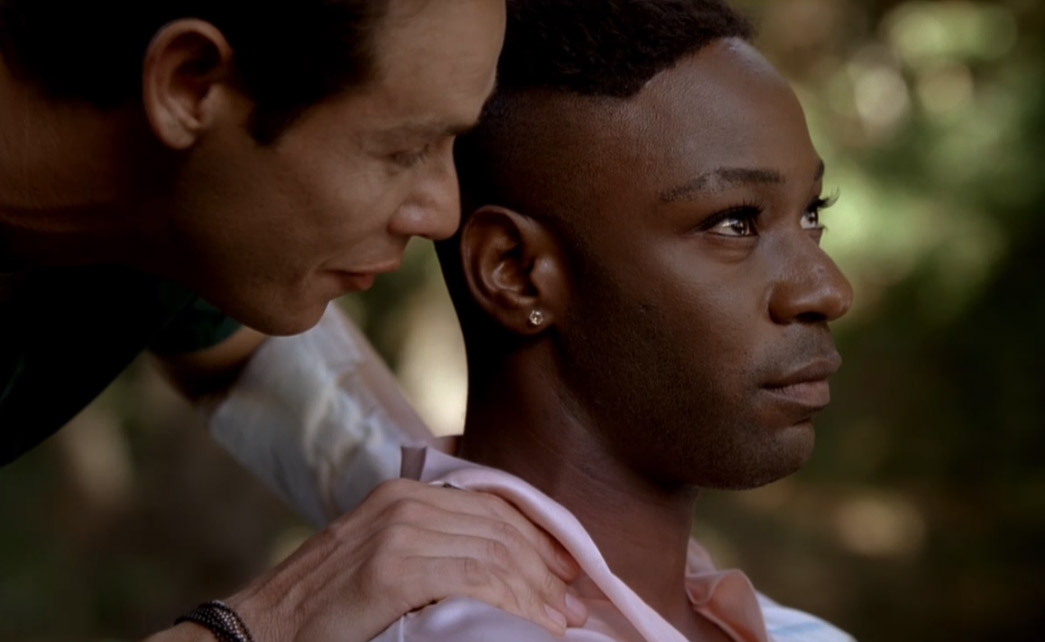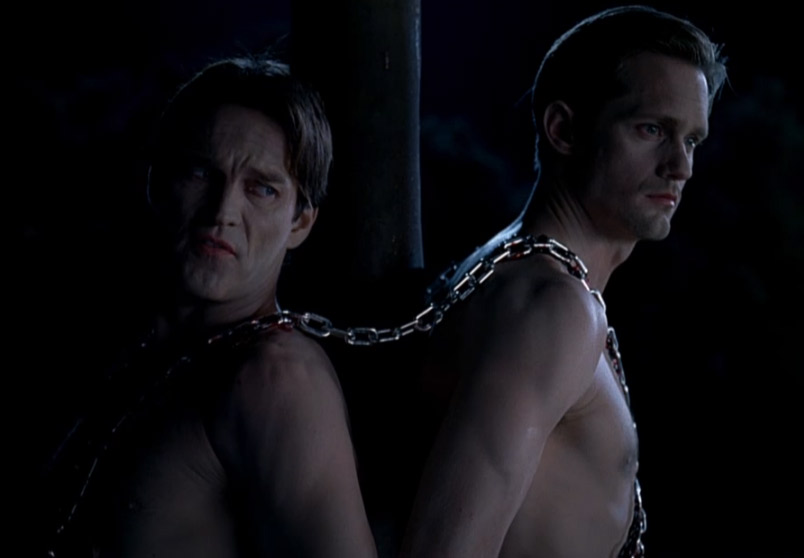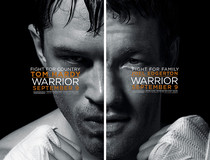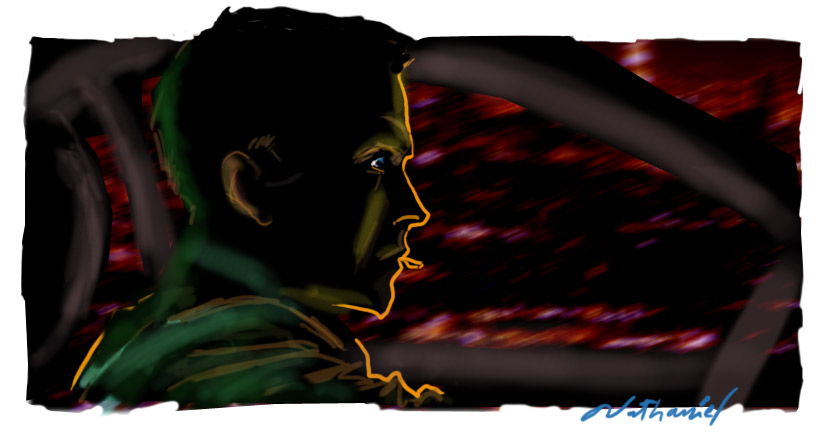
There's 100,000 streets. You don't need to know the route."
The Driver is alone in a hotel room. Looking out over the city at night, negotiating on a cel phone he'll abandon immediately. We never learn his name. We don't need to know it.
His face is Ryan Gosling's, but even so it's a less familiar landscape than you'd think. With Drive, the actor erases any doubts (were there any?) that he's the most exciting young movie star on this side of the Atlantic. For the driver, his face has taken on a new mask-like stillness which twice in Nicolas Winding Refn's brilliant new movie, is covered (redundantly) by an actual mask. There is no knowing this driver; if we were given his name we'd forget it anyway or doubt its authenticity. Even the underscore, a brilliantly retro synth score, that memorably features Kavinksy's "Nightcall" just as we're being introduced keeps us at a certain remove, a hypnotized female voice singing "There's something inside you. It's hard to explain." Indeed.
To summarize the plot of Drive would immediately reduce it to a standard nihilistic noir or crime drama. If you must know -- though I hope you've already seen it because it's best seen cold without knowing the following details -- the driver is a stunt driver for the movies and also a mechanic and also quite willing to be your getaway for crimes. He won't ask questions and you shouldn't either. He just drives. His mechanic boss Shannon (Bryan Cranston, excellent) and his quiet neighbor Irene (Carey Mulligan, excellent) and her child Benico (Kaden Leos, also excellent... you'll be sensing a trend here) are the three people in his life that he seems to care for, despite his dangerously self-possessed aura. In the course of Drive, this walking loner archetype is gradually humanized whether through narrative emotional connections or performance choices. Both the neighbor and the boss have troubled histories including people who are Trouble and the driver's very tight social circle is soon forcibly opened by crowbars, shotguns and handshakes. The cast expands to include a wealthy investor/criminal Bernie (Albert Brooks... seeking Oscar), his mouthy colleague Nino (Ron Perlman, delighted to show off) a lesser criminal Cook (James Biberi) and his associate Blanche (Christina Hendricks, memorably put-out in stilettos), and Irene's ex-con husband with the perfect name of "Standard" (Oscar Isaac, just terrific). Needless to say, shit goes down both in and out of cars. Very violent, exquisitely directed shit goes down.
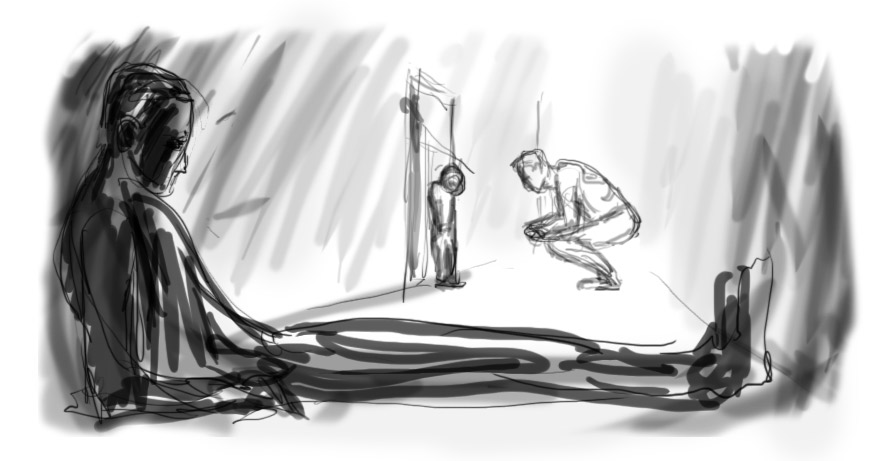
To Refn and Gosling's credit, the unknowable driver doesn't stay a mere Embodiment of Something (like, say, Javier Bardem in No Country For Old Men) which helps the movie immeasurably. The few times the driver's humanity peaks through, his voice trembling, a flash of fear across his face, or even a moment of tenderness are genuinely unnerving; the untouchable man is touched. Even the stoic loner, who loves only driving and barely speaks, can't escape the violent messy pull of humanity. His choice to dehumanize again, donning the mask a second time, is a genuinely frightening image that I haven't been able to shake since seeing the movie.
Drive is one of those movies. It makes you think in and of its images. I generally take notes when I watch films though I can't always understand them afterwards, the danger of scribbling in the dark. My notes for Drive... are strange. The standard illegible chicken scratches appear but there are also crude images scribbled in, attempts to capture the movies indelibe compositions, use of color and general mise-en-scene. (I've recreated two of them here for you since my scanner is broken).
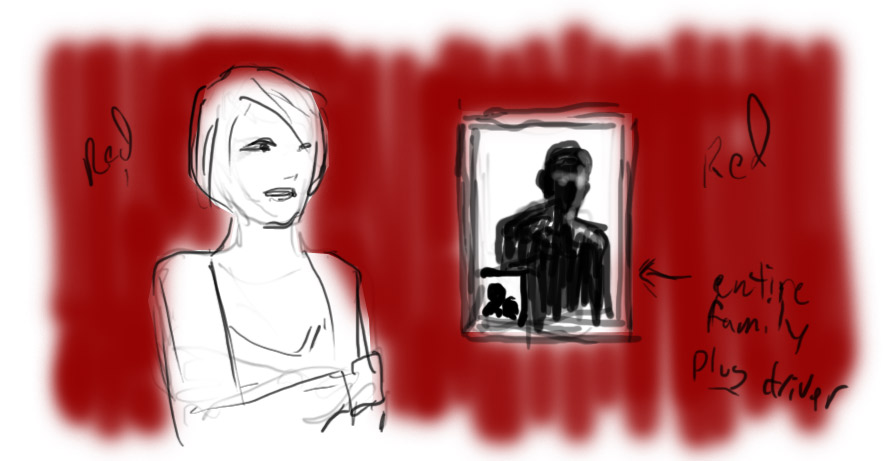 I'm not sure why i wrote red all over this one. Stills show that it's more orange.
I'm not sure why i wrote red all over this one. Stills show that it's more orange.
Drive is just one of those movies, the kind that unfold with such individuality and confidence and sense of possibility that you can almost imagine the celluloid standing up and strutting right past you, knowing full well you're going to turn and look. Yeah, I'm hot shit, it might say, if it weren't so emphatically the strong and silent type. One could argue, as I did with myself on second viewing, that the movie does boast about its own coolness in just this way and too often. If there's something to be said against Drive beyond its nasty nihilism (the extent of the violence is... uneccessary) it's just that. The movie stops in its track a few times and whether or not you're hypnotized (I was absolutely) it's clearly showing off. Let's just say that Nicolas Winding Refn is the most exciting Mad Dane to arrive in the movies since Lars von Trier... and knows it, too.
Though Drive's initial retro impression with the synth score, glistening cityscapes and practically neon hot pink titles immediately is that it's paying homage to the 1980s and Michael Mann, Drive very quickly becomes only its own memorable self. But because it's so emphatically a movie, so possessed by the motion in its pictures --even its frozen tableaus are alive with suggested movement, promised ugly futures you fear you'll lunge towards without warning -- it can't help but recall the great tradition of cinema's coolest movies. Leaving the movie the first time (I've already seen it twice) I thought most of Pulp Fiction. Not Pulp Fiction as we know it now -- annoyingly replicated never duplicated -- but Pulp Fiction back when it first took the world by storm; they aren't much alike but for that blast of intoxicating fresh air in the theater. A/A-

Recommended Further Reading
The Film Experience - "People Will Love It Ten Years From Now"
Nick's Flick Picks - a coiled python
Serious Film -"atmosphere. neon glow and moments that hang in the air..."
My New Plaid Pants "Chrissy Hendricks, Stiletto Wobbler"
In Contention "the finest layer of B-movie grime that time and money can buy"
Have you seen Drive? If so do sound off in the comments.
 Saturday, September 24, 2011 at 10:00AM
Saturday, September 24, 2011 at 10:00AM 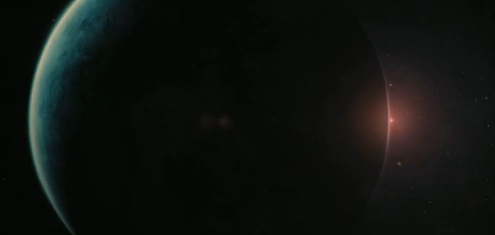
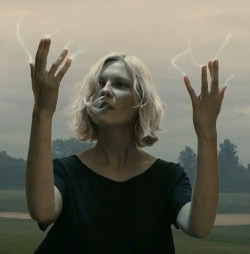 I’m not sure splitting up the stories was the wisest choice, since the second half never recovers the energy of the wedding scenes. I could write that the second half creaks under the weight of its symbolism, but if Von Trier is willing to fill the sky with an ominous death planet named after his own depression, who am I to point out that the whole thing is a bit "on the nose"?
I’m not sure splitting up the stories was the wisest choice, since the second half never recovers the energy of the wedding scenes. I could write that the second half creaks under the weight of its symbolism, but if Von Trier is willing to fill the sky with an ominous death planet named after his own depression, who am I to point out that the whole thing is a bit "on the nose"?








